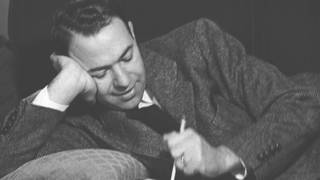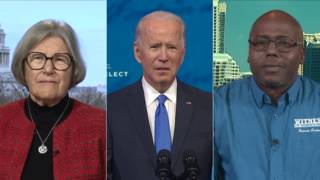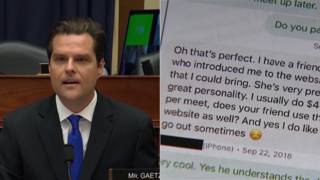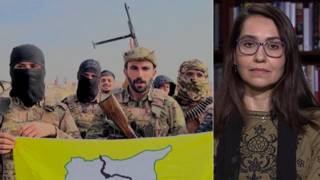
Related
Topics
Guests
- Rev. Roslyn Bouiercommunity pastor, activist, frontline practitioner and executive director of Brightmoor Connection Food Pantry in Detroit.
- Abdul El-Sayedphysician, epidemiologist and the former director of the Detroit Health Department.
Water shutoffs continue amid the coronavirus pandemic in Detroit, despite a moratorium and a program to help thousands of residents restore service last month. The lack of water access comes as nearly 1,500 people in Michigan have died from COVID-19, and 40% of those who have died are African-American, despite making up just 14% of the state’s population. We speak with community pastor and activist Rev. Roslyn Bouier, who has been working with residents to restore their water.
Transcript
AMY GOODMAN: Dr. Abdul El-Sayed, I want to bring into the conversation another guest, as we turn to another major issue in the city of Detroit, facing amidst the coronavirus pandemic: the water shutoffs. Despite the city announcing a moratorium on water shutoffs and a program to help thousands of residents restore service last month, people in Detroit are still reporting lack of access to water and even ongoing shutoffs. This is a video posted by Detroit resident Motisala Ra on Facebook two weeks ago.
MOTISALA RA: So, the Water Department is out here to turn the water off at this home across the street. Mind you, we’re in the middle of a pandemic. They’re here to turn the water off. And this is a family with an infant child. She has two children.
AMY GOODMAN: So, more than 140,000 homes in Detroit have had their water shut off since 2014, according to a local news outlet, the Bridge. As of March 31st, the city had only restored water to 1,000 of the 10,000 people who called to report issues with their water.
We’re now joined by the community pastor, activist, Reverend Roslyn Bouier. She’s frontline practitioner, executive director of Brightmoor Connection Food Pantry in Detroit.
You’re very hard to get a hold of, Reverend, because you are so busy out there getting water to people. Can you explain for people in the rest of the country who might not understand? People have had their water cut off, and even though the city has said they won’t be doing it anymore, there are many people who still don’t have access to water, when the first thing we’re told in this pandemic is you must continually wash your hands?
REV. ROSLYN BOUIER: Yes, that’s true. So, here in Detroit, the water is still not on. I just need to open with that and say that folks are still experiencing water insecurity. No one still has water. The city has, historically, since 2014, turned off over 140,000. And so now the city is saying they’ve turned on 1,200 households. That is nothing in comparison to what is needed. I am seeing folks every day whose water is off. And folks, just as the video that you just showed, are still being shut off from water.
And then, I need to say, Dr. Sayed made a strong point when he said that COVID-19 follows the path of insecurity. And when your water is shut off — right? — when you have no access to clean, affordable water, then that’s going to be the community that’s hit the hardest. Brightmoor sits in the northwest section of Detroit. It has the highest population of water shutoffs. Brightmoor also has the highest population of infant mortality deaths, in the womb and out of the womb, due to water insecurity.
We know that folks normally who would work every day — right? — because when your water is shut off, you look just like you and I. People go to work. They go to school. So, folks have the ability to use restrooms and wash up and get water all day for eight to 10 hours, while they’re outside of the home. The children have the ability to do that.
But when your water is shut off and we are given the directive to shelter in — which, I need to say here and stop for a moment and say, we should stop using that word “shelter,” because we’re not using that word correctly. “Shelter” is defined as having a place of safety and comfort and protection. And when you don’t have water on, that’s not shelter. It’s not shelter when children have to take their waste outside and throw it in the garbage. It’s not shelter when you don’t have water in your home and the sanitation is not available, because the city had declared that laundromats were nonessential providers, so laundromats were closed up, as well.
So, when we see the water shutoff situation, we understand that, contrary to what you’re hearing on the news — and I know that the mayor just recently did a statement saying that he had turned everybody back on, that there were only maybe 50 folks left to turn back on — we know that is not to be the truth, when we just really need the truth to get out. And the truth is, is that folks are still experiencing water insecurity. Folks do not have water, and people are still being shut off from water. Right?
AMY GOODMAN: Let me ask Dr. Abdul El-Sayed — you were former director of the Detroit Health Department at the time this started. How can you see this ending? Are you calling for the restoration of water to all the residents of Detroit?
DR. ABDUL EL-SAYED: Absolutely. So, I started at the city after this policy had already started. It was one of the most frustrating policies to get to city leadership and to the Water Department and say that the public health starts with water. Public health started the moment we figured out how to make sure that people’s water was clean. And the fact that we don’t have clean water, as the reverend rightly points out, what does it mean to tell somebody to stay at home and then to wash their hands with warm soapy water for 20 minutes, when they don’t have running water in their home? It is absurd in the context of a pandemic. It was absurd even before the pandemic started.
AMY GOODMAN: Well, I want to thank you both for being with us, Dr. Abdul El-Sayed, physician, epidemiologist, former director of the Detroit Health Department, and Reverend Roslyn Bouier, community pastor, executive director of Brightmoor Connection Food Pantry in Detroit.
And that does it for our broadcast. A very Happy Birthday to Joe Parker! And we have another birthday to celebrate, a little one. We want to welcome Tully Duncan Littlefield into the world. And congratulations to his proud mama and papa, Amy Littlefield and Daniel Patterson! To see our conversation with our former producer Amy Littlefield about being pregnant during the time of the pandemic, go to democracynow.org.
That does it for our show. Democracy Now! is working with as few people on site as possible; the majority of our remarkable team is working from home to prevent community spread. Democracy Now! is produced with Renée Feltz, Mike Burke, Deena Guzder, Libby Rainey, Nermeen Shaikh, Carla Wills, Tami Woronoff, Charina Nadura, Sam Alcoff, Tey-Marie Astudillo, John Hamilton, Robby Karran, Hany Massoud, Adriano Contreras and María Taracena. Our general manager is Julie Crosby. Special thanks to Denis Moynihan, Becca Staley, Miriam Barnard. I’m Amy Goodman. Thanks so much for joining us.











Media Options